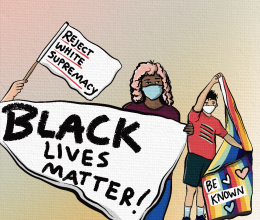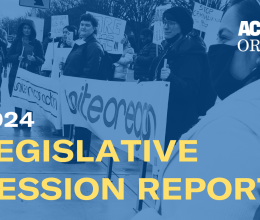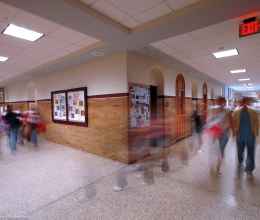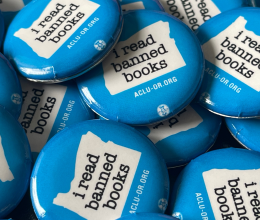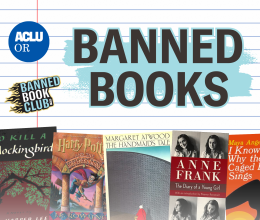
“Protect students’ rights to read, learn and share ideas free from discriminatory censorship.”
SALEM, Ore. — Today, students, teachers, librarians and community members from across Oregon showed up in person at the State Capitol and virtually to support Senate Bill (SB) 1583.
This bill prohibits book bans and other types of censorship in Oregon’s public schools if the ban or censorship constitutes discrimination based on race, national origin, color, sex, gender identity, sexual orientation, age, religion, physical or mental disability, military status or marital or family status. Accordingly, SB 1583 helps school districts avoid wasting the limited tax dollars they need for students on litigating censorship actions — which schools are likely to lose in court anyway because students have protected constitutional rights to read and learn.
SB 1583 comes at a critical time as efforts to ban books are spreading across the country. Oregon is no exception: In 2022, Oregon saw its largest number to date of challenges to books in schools and libraries. Also consistent with national trends, the books being pulled from shelves at alarming rates are often about or authored by the LGBTQ+ community, women and people of color.
Despite the increase in book challenges, censorship is not favored by most voters and parents. A Washington Post analysis determined that 60% of all book challenges across the United States in the 2021-2022 school year were initiated by the same 11 people.
“This is an important First Amendment and democracy issue. The U.S. Supreme Court ruled in 1969 that students do not ‘shed their constitutional rights to freedom of speech or expression at the schoolhouse gate.’ According to the High Court, freedom of speech includes not just the right to speak but also the right to learn,” says Jessica Maravilla, Policy Director at ACLU of Oregon. “Students have a First Amendment right to read and learn about the history and viewpoints of all communities — including their own identities — inside and outside of the classroom. Censorship of books and information is undemocratic.”
Research has found that students who are taught a culturally responsive and racially inclusive education are more academically engaged, perform better in school, have enhanced self-perception and graduate at higher rates.
“Books with diverse characters have positive effects on students’ performance. For Black, Native, Latinx, Asian, Pacific Islander and LGBTQ+ students — who are often stereotyped and overlooked in popular culture — it is personally validating and academically engaging to see their experiences reflected on the page,” says Ivy Major-McDowall, Policy and Advocacy Director at Our Children Oregon. “When books about historically marginalized groups are banned from libraries and schools, this communicates that discrimination is tolerated, perpetuating the exclusion of youth and students with diverse identities.”
Students learn best when they feel affirmed, and Oregon still has a long way to go in making this a reality. “In our expertise, we know that it is critical and even life-saving for students to see themselves reflected in their schools and community,” says Miranda Doyle of the Oregon Library Association Intellectual Freedom Committee. “We also know that students learn best when they feel affirmed and still we have a long way to go in Oregon. The 2022 student survey found that 49% of 8th graders experienced one type of discrimination at least weekly; this percentage jumps to 66% for American Indians and Alaska Natives. According to the Trevor Project, in 2022 only 47% of LGBTQIA+ students felt welcome at school in Oregon. As we see the effects of isolation play out in classrooms across the state, we must prioritize inclusive and welcoming schools so all students feel that they belong.”
Educators across the state urge lawmakers to support students and SB 1583. “The power of seeing yourself as a part of our collective history can be so uniquely affirming. For students who have been historically marginalized, this gives them a powerful connection to their learning," says Lindsay Ray, educator and President of the Beaverton Education Association. "It is a gift for every student and educator — regardless of their identities — to have books and instructional materials that celebrate and truly reflect all our communities."
###
